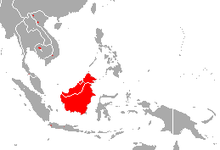Bornean horseshoe bat
The Bornean horseshoe bat (Rhinolophus borneensis) is a species of bat in the family Rhinolophidae. It is found in Brunei, Cambodia, Indonesia, Laos, Malaysia, and Vietnam.
| Bornean horseshoe bat | |
|---|---|
_maybe%3F_(7113337169).jpg) | |
| Scientific classification | |
| Kingdom: | Animalia |
| Phylum: | Chordata |
| Class: | Mammalia |
| Order: | Chiroptera |
| Family: | Rhinolophidae |
| Genus: | Rhinolophus |
| Species: | R. borneensis |
| Binomial name | |
| Rhinolophus borneensis Peters, 1861 | |
 | |
| Bornean horseshoe bat range | |
Taxonomy
The Bornean horseshoe bat was described as a new species in 1861 by German naturalist Wilhelm Peters.[2][3] Peters recognized the type locality of the species as Labuan, Borneo. The specimen used to describe the species had been collected on an expedition by Fedor Jagor.[2] Mammal Species of the World 3rd edition recognized four subspecies of R. borneensis:
Description
It has a forearm length of 41.2–43.7 mm (1.62–1.72 in). Its ears have a length of 16–17 mm (0.63–0.67 in).[3]
gollark: How much competition is there for that?
gollark: The other one kept producing `CthulhuRlyehWgahnaglFhtagnException`s, apparently.
gollark: *That* one was considered an anomaly and contained last year.
gollark: So actually no.
gollark: Although I don't think I specified that it was a uniform distribution.
References
- Jayaraj, V.K. (2020). "Rhinolophus borneensis". The IUCN Red List of Threatened Species. 2020: e.T19527A21982599.
- Peters, W. (1861). "Hr. W. Peters berichtet über die von Herrn. F. Jagor bisher auf Malacca, Borneo, Java und den Philippinen gesammelten Saugethiere aus den Ordnungen der Halbaffen, Pelz-flatterer und Flederthiere" [Mr. W. Peters reports on the Lord's. F. Jagor so far collected in Malacca, Borneo, Java and the Philippines suckling animals from the orders of the half-monkeys, fur-flatterer and bats]. Monatsberichte der Königlichen Preussische Akademie des Wissenschaften zu Berlin (in German). 1861 pt. 2: 709–710.
- Andersen, Knud (1905). "3. On some Bats of the Genus Rhinolophus, with Remarks on their Mutual Affinities, and Descriptions of Twenty-six new Forms". Proceedings of the Zoological Society of London. 75 (3): 75–144. doi:10.1111/j.1469-7998.1905.tb08381.x.
- Wilson, D.E.; Reeder, D.M., eds. (2005). Mammal Species of the World: A Taxonomic and Geographic Reference (3rd ed.). Johns Hopkins University Press. ISBN 978-0-8018-8221-0. OCLC 62265494.
This article is issued from Wikipedia. The text is licensed under Creative Commons - Attribution - Sharealike. Additional terms may apply for the media files.
